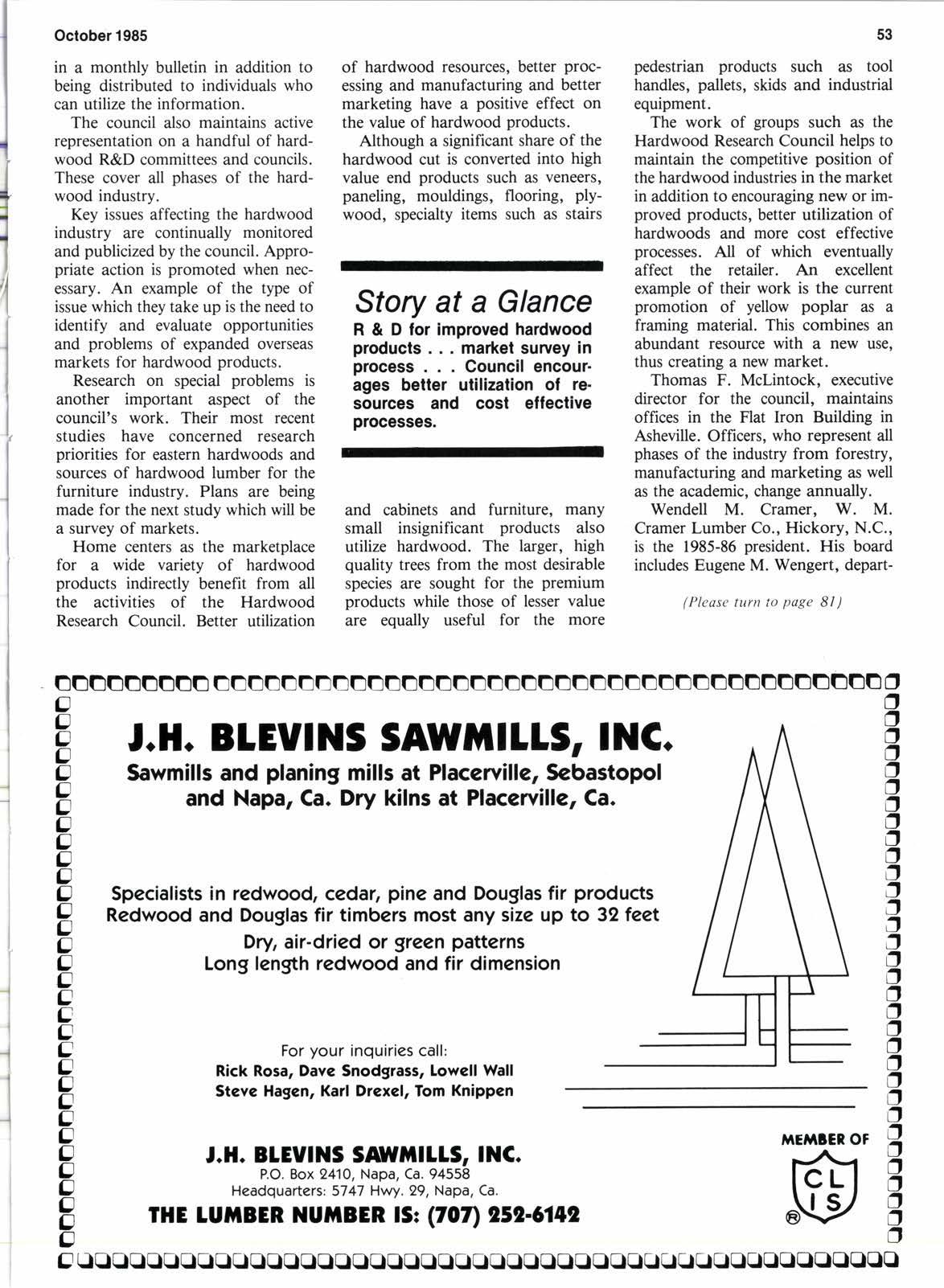
2 minute read
How the Hardwood Research Council works for you
ARDWOOD undergoes many changes on its way from the forest to a home center product, but few retailers are aware of the number of people and organizations responsible for its transformation.
One such support group is the Hardwood Research Council whose purpose is to improve management and processing of hardwoods in the forest, factory and marketplace. The Ashville, N.C., council has been working on these objectives since 1953. Members come from every segment of the industry.
A primary objective of the council is the strengthening of research and development efforts. Covering hardwood product marketing and utiliza- tionaswell as hardwood forest management, they identify, analyze and evaluate needs, then recommend and support necessary action. They also recognize and reward individuals and organizations for hardwood research achievements.
Better products and better prices are often the result of their actions to speed up and make more effective the process of getting new knowledge and technology into use.
In addition to working with research agencies, they sponsor symposiums, workshops, and seminars on technical subjects.
The council also is a clearing house for literature, scientific papers and technical reports. These are reviewed in a monthly bulletin in addition to being distributed to individuals who can utilize the information.
WE SPECIALIZE IN PRE-STAINING ''YOUR MATERIAL" IN ALL OLYMPIC COLORS, COATING ALL 4 SIDES OF EXTEROR SIDING AND DIMENSIONALTRIM. PLUS 4 COAT APPLICATION ON ALL SIZES OF PLWVOOD, ENCLOSED WAREHOUSE FACILW.
The council also maintains active representation on a handful of hardwood R&D committees and councils. These cover all phases of the hardwood industry.
Key issues affecting the hardwood industry are continually monitored and publicized by the council. Appropriate action is promoted when necessary. An example of the type of issue which they take up is the need to identify and evaluate opportunities and problems of expanded overseas markets for hardwood products.
Research on special problems is another important aspect of the council's work. Their most recent studies have concerned research priorities for eastern hardwoods and sources of hardwood lumber for the furniture industry. Plans are being made for the next study which will be a survey of markets.
Home centers as the marketplace for a wide variety of hardwood products indirectly benefit from all the activities of the Hardwood Research Council. Better utilization of hardwood resources, better processing and manufacturing and better marketing have a positive effect on the value of hardwood products.
Although a significant share of the hardwood cut is converted into high value end products such as veneers, paneling, mouldings, flooring, plywood, specialty items such as stairs
Sfo4r at a Glance
R & D for improved hardwood products . . . market suruey in process . . council encourag€s better utilization of resources and cost effective processes. and cabinets and furniture, many small insignificant products also utilize hardwood. The larger, high quality trees from the most desirable species are sought for the premium products while those of lesser value are equally useful for the more pedestrian products such as tool handles, pallets, skids and industrial equipment.
The work of groups such as the Hardwood Research Council helps to maintain the competitive position of the hardwood industries in the market in addition to encouraging new or improved products, better utilization of hardwoods and more cost effective processes. All of which eventually affect the retailer. An excellent example of their work is the current promotion of yellow poplar as a framing material. This combines an abundant resource with a new use, thus creating a new market.

Thomas F. Mclintock, executive director for the council, maintains offices in the Flat Iron Building in Asheville. Officers, who represent all phases of the industry from forestry, manufacturing and marketing as well as the academic, change annually.
Wendell M. Cramer, W. M. Cramer Lumber Co., Hickory, N.C., is the 1985-86 president. His board includes Eugene M. Wengert, depart-
(Please turn to page 8l )










